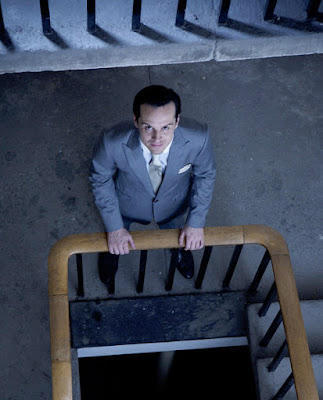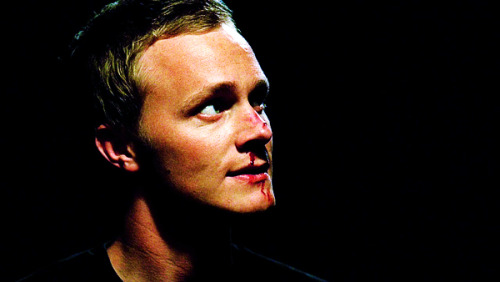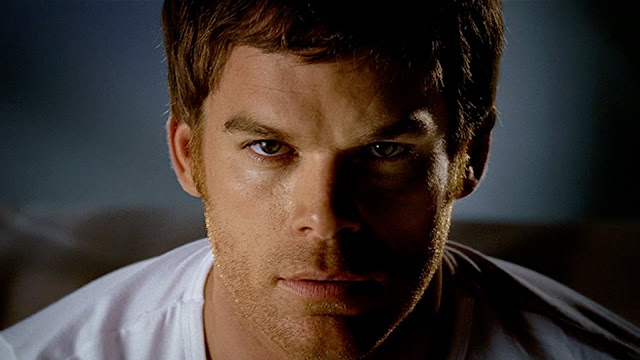by Sonja Stone
How do I craft a villain? Look in the mirror.
 |
| James Moriarty of the BBC’s Sherlock |
In the last few weeks, my blog sisters have skillfully discussed the making of a proper villain. We’ve heard about motivations, backstory, ego, acts of terror. We’ve read about the world’s most horrific villains—many of them real. Today we’re gonna talk about bad guys we love.
BE THE HERO OF YOUR OWN STORY.
We’ve all heard this, right? There’s a flip side that’s never mentioned.
I’m absolutely the hero of my own story, but I’m also the villain.
I’m my own worst enemy, loudest critic, strongest saboteur.
I find it significantly easier to write my antagonist than to write my hero. Maybe because I’m a little sociopathic (see TELLING LIES: YOUR HOW-TO GUIDE). Maybe because I’m an INTP on the Myers-Briggs Personality Inventory. For those of you not familiar with the lingo, being an INTP basically means I’m an introvert who thinks too much, overanalyzes everything, hones in on discrepancies, seeks truth above all else, and asks spectacularly inappropriate questions without realizing they might make some people uncomfortable. It also means when it comes to a discussion (debate), I’m like a dog with a bone. I present my argument, refute my companion’s (opponent’s) points, and never let anything go.
As you might imagine, this direct bluntness can strain interpersonal relationships.
As an INTP, I lean toward liberal thinking, which means I don’t see bad guys as villains so much as antagonists. My disagreeing with someone’s beliefs or moral code doesn’t necessarily make them my enemy, right? It just makes us different.
This is certainly true when it comes to espionage. Same war, different armies.
But back to me.
This past week I branched out and became an antagonist not just in my life, but in the lives of others. Not deliberately; just me and my big mouth.
My sensei informed me a few days ago that my need to be brutally honest all the time isn’t as endearing a quality as I seem to believe. The real problem with brutal honesty is this: While some truths are absolute, for the most part, truth is relative. My truth isn’t necessarily THE truth, is it? But as Jessica Rabbit says, “I’m not bad. I’m just drawn that way.”
So on to our bad guys…
So on to our bad guys…
BAD GUYS ARE MORE FUN.
They don’t get bogged down with sticky moral codes.
While some might argue that life without antagonists sounds sublime, I think we can all agree that FICTION without antagonists would be dreadfully dull. To that end, I’ve collected a handful of my personal favorites. Because I’m a thoughtful instigator, I’ve selected from series that are readily available on Netflix. Lock your office door, pop some popcorn, and live vicariously through these bastards. Because—take my word for it on this—playing the real-life antagonist isn’t worth the collateral damage.
 |
| Shane Walsh and his Mossberg 590 |
1. Shane Walsh (The Walking Dead)
Do you remember Shane? Horrible guy. He locked his best friend, Rick, in the hospital and then slept with his wife? Then killed a bunch of innocent people?
But that’s not exactly what happened. Rick was in a coma and couldn’t be moved. So Shane escorted Rick’s wife and young son, Carl, to safety. Eventually, Shane and the wife fell in love–they thought Rick was dead. Sure, Shane killed an innocent person to save his own life–but he also saved little Carl in the process. And yes, he was going to kill Rick so he and Lori could live happily ever after, but to be fair, who survives a coma in the post-apocalyptic zombie world?
Takeaway: Don’t ask a man to protect your family and then get pissed when he does.
2. Dexter Morgan (Dexter)
How do you make a sociopathic serial killer who is incapable of feeling emotion sympathetic to your viewers? Give him a code. He only kills people who really deserve it. Most of the time.
Dexter is a perfect example of that fine line between hero and villain. Personally, I love a vengeance killing, but I know that’s not everyone’s cup of tea.
Takeaway: Karma’s a bitch.
3. Helena, the Ukrainian Sister-Clone (Orphan Black)
Helena calls her clone sisters “sestras,” which, I assume, is Ukrainian for “sisters.” She was trained as an assassin—and she’s really good at her job. Eventually, she stops killing her sestras and joins forces with them.
She’s loyal and fierce. She fights for herself and anyone she loves. And her matter-of-fact conversational style feels so right. Here’s a snippet from a bar scene, illustrating that sometimes we (women) do like to drink alone.
Man: You broke my finger!
Helena: Don’t be baby. I only sprain. Next one I break.
Takeaway: No means no.
 |
| Julian Sark, in the midst of negotiating |
4. Julian Sark (ALIAS)
Sark switches sides more often than I offend people (a lot). After he’s captured by his enemy and threatened with violence, he responds, “Not a problem, my loyalties are flexible.”
The well-known MICE acronym lists the four reasons one might become a spy: Money, Ideology, Compromise, Ego. (If you’re in the camp that feels MICE should be revised to MINCES to include Nationalism and Sex, I would argue that Nationalism is Ideology and Sex is about Ego.)
Sark is wholly motivated by fortune. And sometimes sex (ego).
Takeaway: Know what motivates your enemy. Only one of these is impenetrable (ideology).
5. James Moriarty (Sherlock)
The BBC’s brilliant version of Sherlock Holmes is so perfectly cast, featuring Andrew Scott as Jim Moriarty (Sherlock’s nemesis). The co-creators and writers, Mark Gatiss and Steven Moffat, have this to say about Moriarty:
Mark Gatiss: Bad people don’t know they’re bad. They think they’re RIGHT! He’s just having fun. Anything to distract him from the dreary monotony of existence. If you’re that terrifyingly intelligent, then what’s left for you?
Steven Moffat: He’s playing because he’s bored—a malevolent child without limits. Psycho on a sugar rush.
Takeaway: Find a hobby.
So many bad guys, so little time.
Who’s your favorite villain? I’m always looking for new role models (for my writing, of course), so leave a name in the comment section below!
For those of you interested in exploring your own Myers-Briggs Personality Inventory, check out 16personalities.com. It’s a free (abbreviated) online test, and the results seem to be quite accurate.
Shane: http://walkingdead.wikia.com/wiki/Mossberg_590
Dexter: http://comicvine.gamespot.com/forums/battles-7/dexter-morgan-vs-jax-teller-1605382/
Dexter: http://comicvine.gamespot.com/forums/battles-7/dexter-morgan-vs-jax-teller-1605382/
Sark: http://halboor.com/julian-sark
Helena:https://s-media-cache-ak0.pinimg.com/236x/ed/0c/de/ed0cde185b902c2b3740a36fc5fa54a3.jpg
Helena:https://s-media-cache-ak0.pinimg.com/236x/ed/0c/de/ed0cde185b902c2b3740a36fc5fa54a3.jpg



















































Fascinating article, Sonja! You have listed several "complex" villains featured in stories where their motivations and efforts focused on one or two individuals (Moriarty vs. Sherlock — absolutely love that series….and try to record those shows when they resurface on the cable networks!) You ask us to name a villain — the first one who comes to my mind didn't focus on one or two individuals but an entire population. I'm thinking about the revolutionary Pol Pot. In his effort to reorganize Cambodia into a "classless peasant society" he and his cronies managed to kill millions of Cambodians by execution, starvation, disease and overwork. In one particular camp, only 7 out of 200,000 prisoners survived. Pol Pot killed civil servants, "intellectuals," anyone with a higher education, even people who wore glasses. (Guess he figured they used them to read or something.) A villain like this trumps most of the ones I have read about in novels or seen in movies, at least in my mind. Thanks for your great post and for asking us for our nomination.
I would have to nominate Raymond "Red" Reddington, antihero extraordinaire of The Blacklist, one of my guilty pleasures. Red is so brilliant, so uber-knowing in the criminal world he navigates, that he is impossible not to root for and oddly enough, admire. Although he kills others, even lifelong friends, when he deems it necessary, he conveys a lurking sense of having higher loyalties–although to what, is always closely held. That kind of ambiguity and shades-of-gray complexity is vital in a character that is both one of the FBI's Most Wanted, and their chief collaborator. Fascinating premise.
Francine, I can't believe I forgot Red! I adore him! And James Spader is absolutely perfect in the role, isn't he? Good catch!
Karna, you're so right! S. Lee Manning mentioned Pol Pot in her post (https://www.roguewomenwriters.com/2016/08/making-mr-wrong.html) last week. He's one of the terrifying worse-than-fiction villains.
I love the list, Sonja, but the scariest villains for me are Pol Pot, Stalin, and Hitler, and for none of them, even though they thought they were heroes, do I have anything other than fear and loathing. No fictional villain comes close to the body count of these bastards, although I understand J.K. Rowling based Voldemort on Hitler.